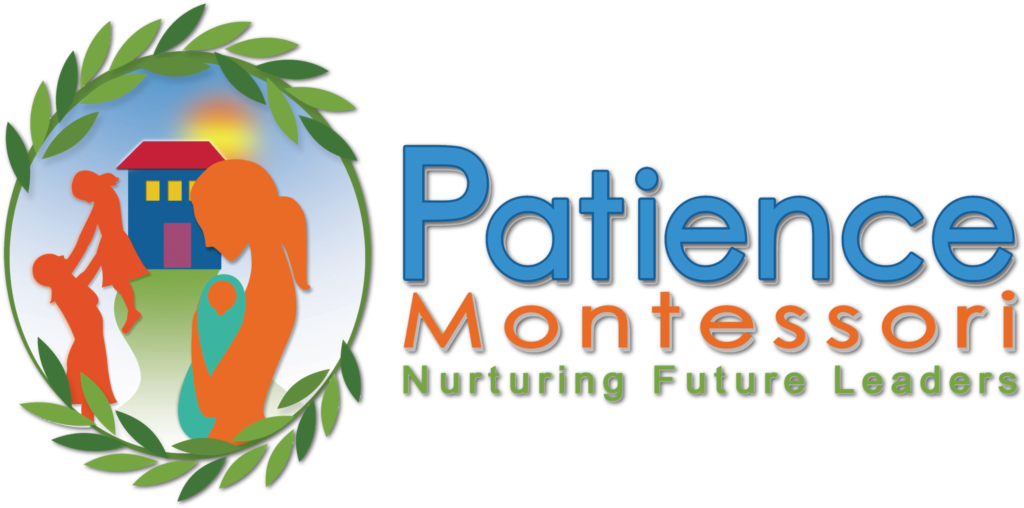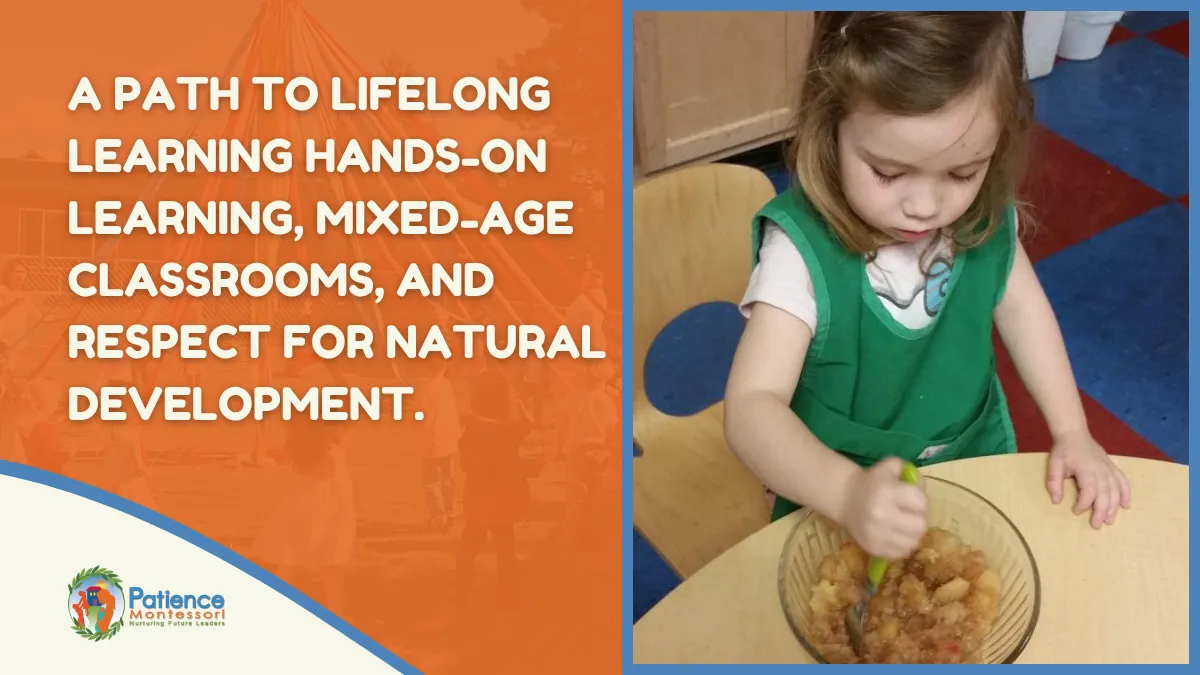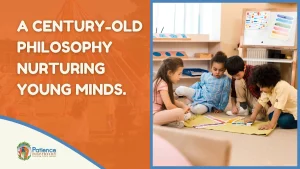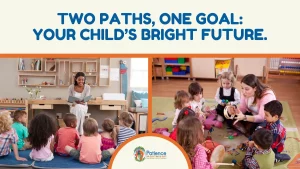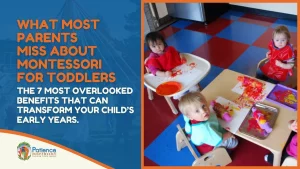Patience Montessori School is committed to the Montessori approach of education; providing freedom within a prepared environment, stressing individualized academic learning and development for the whole child. The Montessori method of education develops the child’s five senses through manipulative materials in the classroom. Learn more about our Montessori program boulder.
Each classroom is equipped with classic Montessori materials that provide hands-on education. These materials are arranged in a progression of graduating difficulty, allowing the child to progress at his/her own pace. A Montessori curriculum is more than reading, writing, and math — life skills and coordination are also incorporated into our teaching.
To help you navigate the options objectively, this guide will walk you through the most important factors to consider—from accreditation and teacher credentials to the specifics of a well-designed curriculum. By the end, you’ll have a clear checklist of what to look for on a tour and in an admissions packet, so you can confidently choose a program that fits your family’s needs.
Montessori Preschool Boulder: Accreditation & Teacher Training
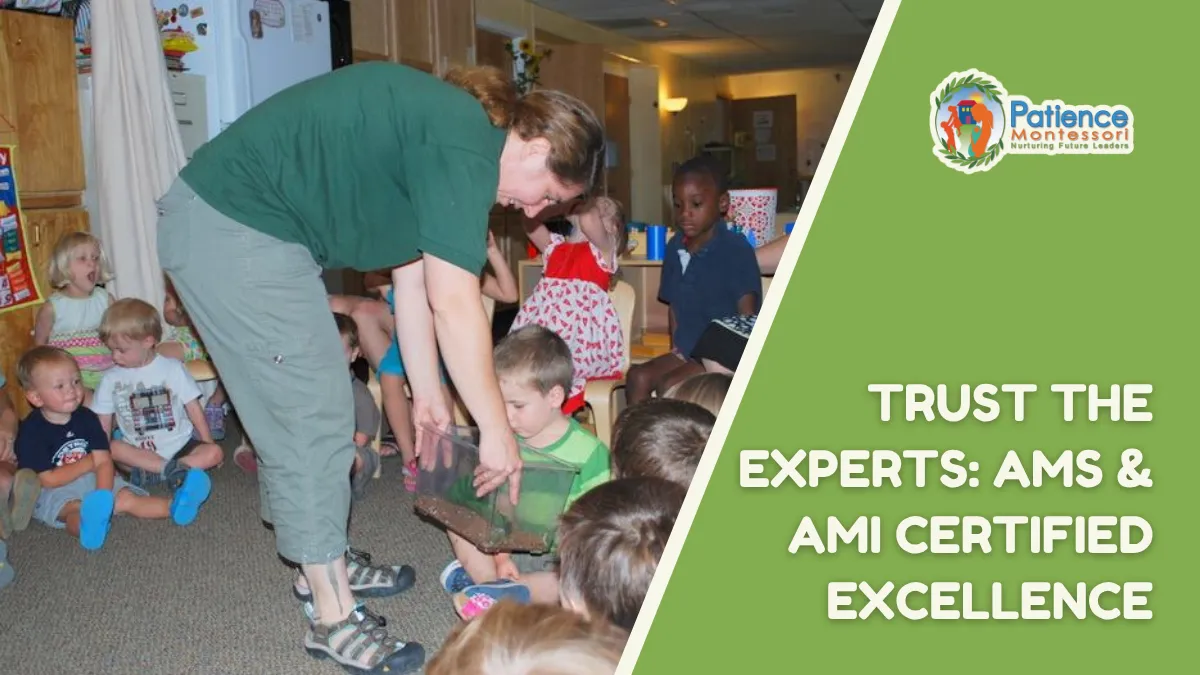
When evaluating “Montessori Preschool Boulder” programs, one of the first things to check is accreditation. Accreditation bodies such as the American Montessori Society (AMS) and the Association Montessori Internationale (AMI) set rigorous standards for classroom materials, teacher training, and administrative practices.
A program that carries AMS or AMI accreditation has demonstrated compliance with those high standards—everything from the ratio of children to trained guides, to the regular assessment of teaching methods and materials.
Beyond organizational endorsement, you’ll want to dig into the qualifications of each lead teacher. Montessori credentials come in different levels, typically covering 0–3 (infant), 3–6 (primary), and elementary certifications. For example, a teacher with a 3–6 credential has undergone at least 450 hours of intensive training plus practical experience in a lab school.
This depth of preparation matters: certified guides understand how to observe each child, introduce lessons in sequence, and intervene only when a child needs guidance—true hallmarks of authentic Montessori practice.
Key questions to ask on your tour or in a phone conversation:
“Is your school accredited by AMS or AMI, and when was the last reaccreditation?”
“What Montessori credentials do your lead teachers hold, and how much classroom experience do they have?”
“How does your program support ongoing professional development for guides?”
The answers will reveal whether a preschool truly adheres to Montessori philosophy, and whether its adults are equipped to nurture your child’s independence and love of learning.
Montessori Curriculum Boulder: What to Expect in the Prepared Environment
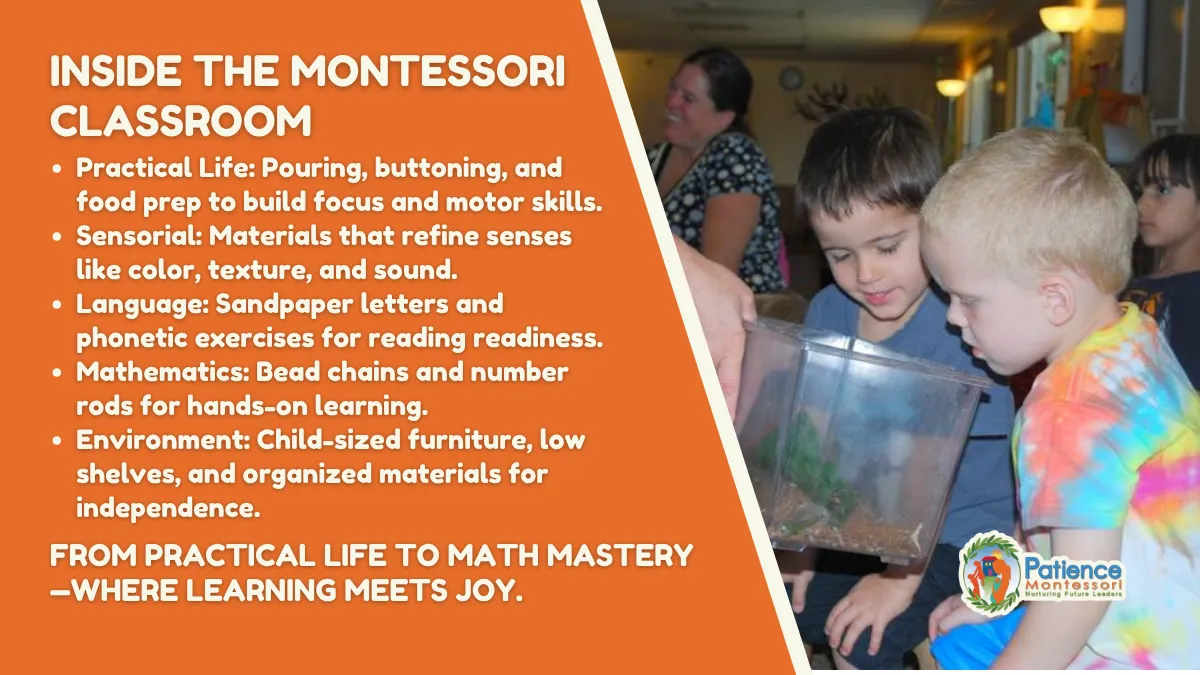
Next, turn your attention to the heart of Montessori education: the prepared environment. Searching for “Montessori Curriculum Boulder” isn’t just about curriculum outlines—it’s about observing how materials, schedules, and space invite exploration and discovery.
Core curriculum areas include:
- Practical Life: Activities like pouring, buttoning, and food preparation build fine-motor skills and concentration.
- Sensorial: Specialized materials isolate concepts such as color, texture, weight, and sound to refine the child’s perceptions.
- Language: From sandpaper letters to phonetic reading exercises, young learners progress at their own pace through a rich sequence of activities.
- Mathematics: Concrete tools like bead chains and number rods introduce concepts of quantity, sequencing, and arithmetic before any abstract symbols appear.
A true Montessori classroom has low shelves, child-sized tables, and clearly defined work areas. Materials are neatly organized, accessible, and sequenced so that each new lesson builds on the last.
Mixed-age grouping—typically spanning three years—lets younger children observe more skilled peers, while older children reinforce their learning by mentoring.
By assessing these curriculum components and classroom dynamics, you’ll gain insight into whether a Boulder preschool truly embodies the Montessori method—and whether it will support your child’s natural curiosity, creativity, and self-discipline.
Now that you have a clear understanding of the Montessori curriculum and what makes it unique, the next step is to see it in action. Visiting a Montessori program in person allows you to observe how these principles come to life in the classroom.
Visiting & Evaluating a Montessori Program in Person
Choosing the right Montessori program is not just about reviewing websites or brochures; a personal visit is essential to truly understand how the school operates. Observing classrooms, interactions, and the overall environment will help you gauge whether the program aligns with your child’s needs and the Montessori philosophy. Here’s a guide to make the most of your visit.
Key Observations to Make
When visiting a Montessori school, pay attention to the following aspects to assess the quality and authenticity of the program:
Classroom Organization and Environment:
- Look for clean, well-organized, and inviting classrooms. Montessori environments are intentionally designed with child-sized furniture and low shelves for easy access to materials.
- Check if the materials are authentic Montessori tools—typically wooden and durable, rather than plastic or overly decorative.
- Observe a sense of calm and order, with children focused on their tasks, even in a mix of age groups.
Teacher-Child Interactions:
- Watch how teachers interact with the students. Montessori guides should foster independence by allowing children to work on tasks at their own pace while stepping in only when needed.
- A good Montessori guide observes more than directs, allowing children to take the lead in their learning.
Student Engagement:
- Notice whether children are freely choosing activities and deeply engaged in them during extended work cycles. This independence is a hallmark of Montessori.
- Mixed-age groups should demonstrate collaboration and mentorship, with older children assisting younger peers, which is integral to the Montessori model.
Questions to Ask During Your Visit
Be sure to ask thoughtful questions that can help you understand the depth and authenticity of the program. Here are a few important ones to consider:
- What is the student-to-teacher ratio?
- How do you address discipline and emotional regulation in the classroom?
- What does a typical day look like for children in this program?
- How does the program foster a connection with the local Boulder community?
Red Flags to Watch For
While many schools promote themselves as Montessori, not all adhere closely to its principles. Be cautious of the following red flags:
- Disorganized or Chaotic Environments: A true Montessori classroom should feel calm and structured, even amid active child-led learning.
- Limited Authentic Montessori Materials: A lack of well-maintained Montessori tools could indicate that the program does not fully follow the philosophy.
- Teacher-Dominated Classrooms: Montessori classrooms focus on child-led exploration. If teachers are directing all actions or providing constant group instruction, the program may not be authentic.
- Short Work Cycles: Children should have ample uninterrupted time (at least two to three hours) to engage in self-chosen activities.
Making the Most of Your Visit
After your tour, take a moment to reflect on your observations and ask yourself how you felt within the space. Did it seem like the type of environment where your child could thrive? Were the teachers approachable and confident in their responses to your questions? Use these insights to make a well-informed decision.
By observing carefully, asking the right questions, and noting potential red flags, you’ll be well-prepared to evaluate whether a Montessori program aligns with your child’s needs and your family’s values.
Your Child Deserves the Best: Why Patience Montessori Tops Boulder Montessori Programs
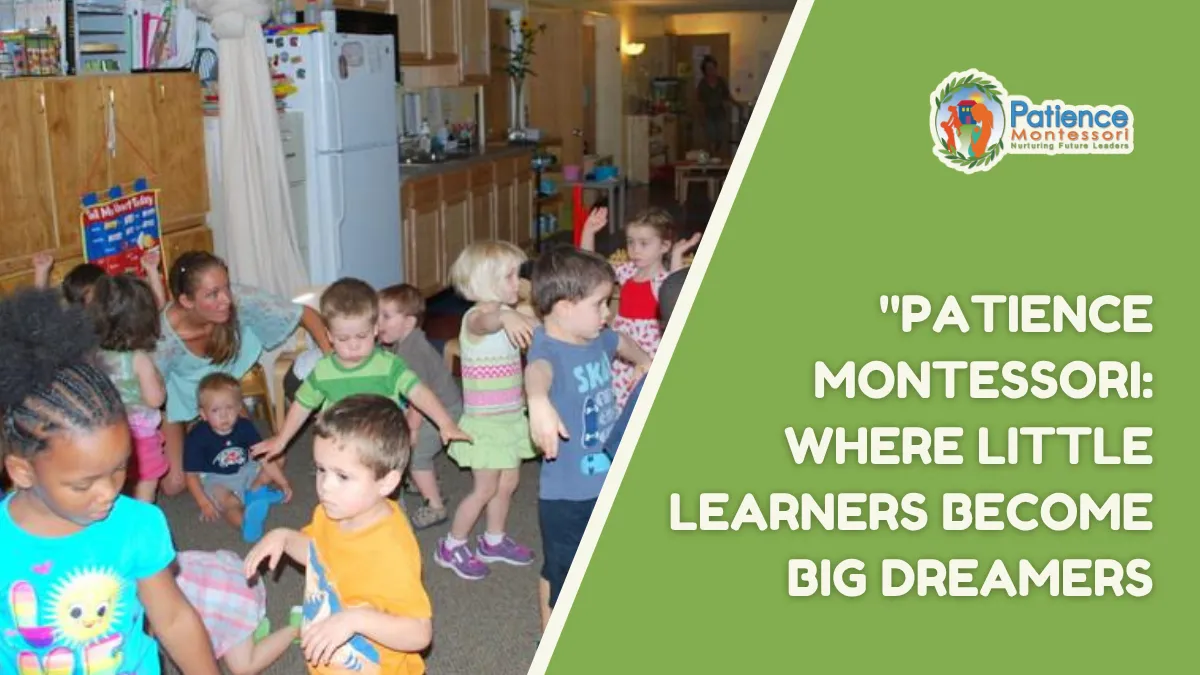
From the moment you step through our doors, Patience Montessori feels different—and for good reason. We’re fully licensed by the State of Colorado Division of Childcare and meet or exceed every Fire, Health, and childcare regulation, so you can trust we put safety first.
As an initiated member of the American Montessori Society, our school follows the rigorous AMS guidelines for classroom materials, teacher training, and administrative practices, ensuring your child receives an authentic Montessori experience.
Our classrooms span two- to three-year age groups, creating a warm “second family” where older students naturally mentor younger ones and every child moves forward at their own pace. This multi-age environment not only fosters leadership and empathy but also lets each learner tackle advanced topics exactly when they’re ready.
With a student–teacher ratio as low as 4:1—well below state requirements—your child benefits from uninterrupted, individualized guidance from their Montessori guide, who has undergone extensive AMS/AMI training and continuously observes and adapts lessons to your child’s interests.
Beyond core academics, our dedicated support staff brings enrichment in foreign languages, gymnastics, American Sign Language, music, and art right on campus. We even offer optional extracurriculars like piano, dance, and fitness, so every child can discover new passions in the same familiar, nurturing environment.
If you’re looking for a school that combines state-licensed safety, AMS-backed authenticity, exceptional ratios, and a truly kid-centered community, Patience Montessori is your answer. Schedule a tour today at PatienceMontessori.com/Contact and see firsthand how we empower lifelong learners.
